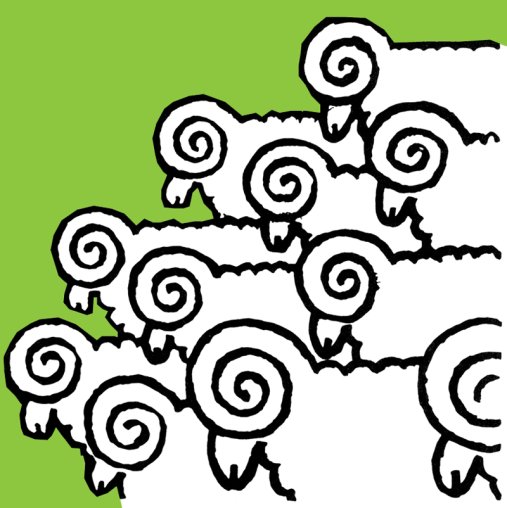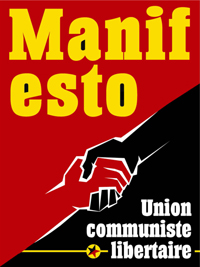 To fight all Forms of Alienation
To fight all Forms of Alienation
The emancipation of each individual is not, for us, a secondary perspective. Far from opposing them, we affirm that the fight for individual freedom cannot advance without the support of collective struggles.
Bearer of egalitarian and anarchist aspirations that go beyond the class struggle alone, the emancipation of each individual is not, for us, a secondary perspective. Far from opposing them, we affirm that the struggle for individual freedom cannot progress without the help of collective struggles.
In order to justify, or simply to mask the domination and the material mechanisms that implement it, the dominant classes and social groups maintain ideologies that, combined, form the dominant ideology.
This ideology, relayed at all levels of society, leads an important part of the proletariat and dominated social groups to support a social order contrary to their interests.
At work, where the individual is fragmented, dominated and reduced to the status of a commodity. In daily life, where the mode of consumption is determined by the logic of profit, the dictates of beauty standards and the artificial needs generated by marketing techniques. If capitalism supports, while renewing them, multi-millennial alienations, it carries in itself specific alienations.
Capitalism has not engendered all the alienations that constitute this dominant ideology, but they serve to cement its domination, and to justify the established order by distilling hatred and divisions in the population.
A radical criticism of religions
As such, religions are among the main vectors of alienation : by the vision of the world they propose, by the hierarchical forms they have given themselves, by their claim to enclose the life of each and everyone, even in its strictest intimacy, in a network of dogmas, taboos and imposed rules (right to abortion, sexuality, marriage as a norm, patriarchy, etc.).
We are not fighting believers, but dogmas : we are for the freedom of worship, respecting the choice of each and everyone. We denounce persecutions and prohibitions against believers. But the UCL is an atheist organization, and we defend a project of society freed from religious alienation.
Indeed, we refuse any grip of religions on society and we want to subject them to radical criticism, because they serve to justify an inequitable social order. We fight against speeches that seek to shield whole sections of social reality from criticism in the name of the « sacred » or the « divine ».
Contrary to what they claim, religions are not cut off from society, they have a place in the political space and can be used to support extreme right-wing ideologies.
Against essentialist alibis
We question the gendered, social, hierarchical norms imposed throughout life in the name of an alleged « nature » or under the guise of a scientism that justifies social inequalities and confines each being to biological data, heredity or DNA that are supposed to determine their future and limit their free will.
For an emancipatory education
We affirm that the educational system plays a considerable part in the alienation of the individual by reproducing the established social order and making him or her accept it from an early age. An emancipatory form of education is necessary to collectively overcome our alienations. For all that, we are aware that action on education alone is not enough to build the society to which we aspire.
Faithful to our political current which, since its origin, has taken up the educational issue, we defend values and pedagogical practices based on rationalism, cooperation, creativity, respect for the specificity of each and everyone to form free and responsible individuals, capable of understanding and acting on the world around them. We also give a special place to raising awareness against racist, sexist and social discrimination because it aims to empower people to act against it. Anarchists advocate an education that aims to develop, without prioritizing them, physical, intellectual and artistic capacities. An education accessible throughout life that will emancipate from submission to authority, to competition, and will make it possible to achieve a society of solidarity and equality. In order to achieve this, the means are as important as the ends, which is why we endorse the practices of anti-authoritarian pedagogies and popular education.
Against ableism
The capitalist society is an eminently ableist society. Ableism is an oppression that affects people with disabilities (physical or mental, visible or invisible). Capitalism encourages and supports ableist structures, insofar as it validates individuals according to the capacities that make them productive or exploitable in the sphere of wage-labour. People who do not correspond to these norms are literally invalidated, and thus excluded, marginalized or minorized. Ableism is also crystallized in urban infrastructures, which are, most often, only adapted to a typical able-bodied individual (an individual who is not in a wheelchair, for example). People with disabilities will generally be more affected by precariousness and dependence as they have more difficulty accessing the sphere of work. In a system that makes labour value a principle of integration and valorization, they are also discredited, both symbolically and socially.
No prejudices or bonds
We are in favour of a global struggle that will attack all forms of alienation and oppression, and seek to achieve the goal of absolute respect for each and every person, so that all people can live, love, work, create, and express themselves freely, without barriers of skin colour, creed, sex, nationality, age, or lifestyle, so that all people can find a place in human society, flourish, and have a satisfying livelihood.
We therefore advocate mutual support between the class struggle and the various struggles against alienation. The destruction of the capitalist order, of patriarchal and racist domination, the construction of new egalitarian and anarchist social relations, will provide the necessary—albeit not sufficient—basis for an era of emancipation. We do not, however, endorse radical individualism ; the freedom of some must not become a pretext for the oppression of others.








